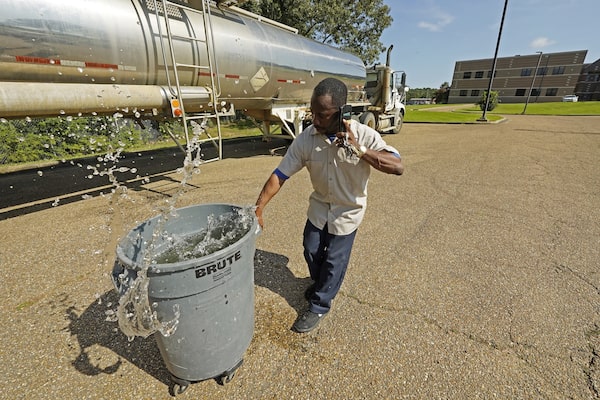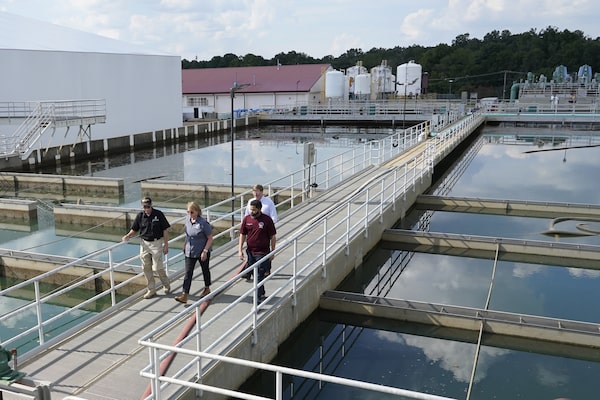Volunteers carry bottled water to a distribution site in Jackson, Miss., earlier this month. Floods and a breakdown at the main water-treatment plant cut off the city of 160,000 from running water.Rory Doyle/Reuters
One sweltering morning in early September, Alphonse Michael found himself driving around Jackson, Miss., searching for water. The 65-year-old, a hospital food-service worker, has a wife and three children at home. He was hoping to gather enough bottled water to let them drink, cook and bathe for at least a couple of days.
Mr. Michael, like all citizens of Mississippi’s capital, hadn’t had drinkable water in his taps since July when pumps at the city’s main treatment plant broke down. Then, in late August, heavy rains caused the Pearl River to flood, overwhelming the plant entirely and leaving Jackson’s 160,000 residents without any running water at all.
It wasn’t the first time Mr. Michael had been through this. The city has suffered numerous outages over the years, including during an ice storm in early 2021 that caused water mains to burst and shut down service for a month in sub-zero temperatures. “This problem should have been resolved a long time ago,” Mr. Michael said wearily as he waited in his car in humid, 31-degree heat to collect a case of water at a community centre. “If the politicians could get their act together, this would be fixed.”
This time around, it would take a week for the city’s taps to flow again, and nearly two months before the water was safe to consume.

Alphonse Michael, 65, waits in his car for cases of water.Adrian Morrow/The Globe and Mail
That a city in the world’s wealthiest country keeps losing access to such a basic necessity may be shocking. But it could be a harbinger of things to come across the U.S. Worsening climate change is leading to more cases of extreme weather, and communities everywhere are dealing with the same aging infrastructure and persistent inequalities that plague Jackson.
“So many cities have not paid attention to these problems, not thinking that this day would come,” said Carol Blackmon, 60, a Jackson organizer with Black Voters Matter, as she handed out water in the parking lot of a mall. “This is about environmental injustice.”
Jackson’s troubles began in the 1970s, when wealthier white residents opposed to desegregating the city’s schools started decamping for the suburbs. From a peak of more than 200,000, the city’s population ultimately dropped by a quarter. This long-term decline has left Jackson with overextended infrastructure and a shrinking tax base.
At the same time, the federal and state governments have mostly refused to pitch in.
Harvey Johnson, who was the city’s mayor from 1997 to 2005 and from 2009 to 2013, estimated that his administrations put a total of US$150-million into repairing water infrastructure. It wasn’t enough, and two master plans to fully fix the system remained unfunded. During one water outage in 2010, the state government had to install portable toilets on the lawn of the legislature.
Mr. Johnson figured it was the perfect time to ask for a US$12-million grant to replace some of the hundred-year-old pipes around downtown. Legislators would only agree to a US$6-million loan. “The money was never there,” he said. “They have been very insensitive to the fact that a lot of Jackson’s water users simply cannot afford another increase in water bills.”

Santonia Matthews, a custodian at Forest Hill High School, hauls away a trash can from a tanker set up in the school's parking lot to give residents a source of non-potable water.Rogelio V. Solis/The Associated Press
:format(jpeg)/cloudfront-us-east-1.images.arcpublishing.com/tgam/MJVNPQW7UZKZXNWZKHQOF2AZFE.jpg)
:format(jpeg)/cloudfront-us-east-1.images.arcpublishing.com/tgam/EY2TNA3F2ZHETIQBUCIV5QRARI.JPG)
To many here, racism, classism and political partisanship have defined the relationship between the city, which is 82 per cent Black and governed by a Democratic mayor and council, and the state government, which is dominated by white Republicans. The city’s poverty rate – 24.5 per cent – is five per centage points higher than the state’s overall, and nearly double the national average.
D’Andra Orey, a political scientist at Jackson State University, described the state’s policy-making toward Jackson as “racial conservatism”: enacting austerity measures that disproportionately hit Black people. “Jackson is not a priority because these are not, in their minds, their constituents,” he said.
During last year’s ice storm, Mississippi Lieutenant-Governor Delbert Hosemann told the Mississippi Free Press that it was up to Jackson to fix its own water supply. He also incorrectly suggested that the city had made no infrastructure repairs since it was run by a white mayor in the 1990s.
By comparison, Prof. Orey pointed out, state officials were recently caught redirecting money from the welfare budget to Mississippi-born former football star Brett Favre and politically connected companies.
Governor Tate Reeves has defended his administration’s handling of the water crisis, arguing he “never received a real plan from Jackson” on fixing the distribution system. He also pointed the finger at the city for not doing more to crack down on people who don’t pay their water bills. Jackson spent a decade in litigation with Siemens over a failed contract with the company to create new water meters.
Some city residents said they couldn’t afford to pay.

Lucene Ervin, 63, says his water bill is US$3,000 in arrears.Adrian Morrow/The Globe and Mail
Lucene Ervin, 63, unable to work because of his diabetes, said he lives on a monthly US$897 disability cheque. His rent is US$500, leaving little for food and utilities. He’s racked up US$3,000 in water bill arrears. “We pay the water bill, but can’t drink the water. And if we don’t pay, we get cut off,” he said.
The effects of both unrepaired infrastructure and pervasive poverty are visible around the city. Many roadways have wave-like undulations and potholes large enough to trap a car. Neighbourhoods are dotted with abandoned houses, boarded-up storefronts and empty shopping malls. Ruined buildings have given way to urban forest and prairie.
Carolyn Willis, 67, said her water quality has been suspect for years. At one point, she said, she came down with such serious stomach problems she had to go to the hospital emergency room. A doctor there diagnosed her with a bacterial infection, which Ms. Willis believes was caused by drinking tap water. “You have to use bottled water to drink, cook with, brush teeth, have a wash,” she said.
On the campus of Jackson State University, first-year student Niyah Robinson said residence showers were down for three days at the start of the semester. The lack of water also lead to the air-conditioning system being turned off, sometimes leaving dorm rooms more stifling than outside. “The water came back on, but it’s not necessarily clean. Sometimes it comes out brown,” she said. The university ultimately brought in portable showers.
John Tierre, owner of Johnny T’s Bistro and Blues, said staff were coming in three hours early to boil water for use in cooking and dishwashing. He estimated he spent between US$300 and US$500 per day on bottled water, canned drinks and ice to make up for the lack of tap water.
“How much can a restaurant take of that? It’s already small profit margins, and we’re dealing with a labour shortage, rising food prices, supply chain problems as well,” said Mr. Tierre, 45, as he sat on the patio of his establishment in the Farish Street historic district.
:format(jpeg)/cloudfront-us-east-1.images.arcpublishing.com/tgam/RLXMEWF7ORJZTGQIZFMRZBHXKI.jpg)
:format(jpeg)/cloudfront-us-east-1.images.arcpublishing.com/tgam/LSCVPUVSJRKN3D26KUCK5XR77M.jpg)
One city hospital, Merit Health Central, rented tanker trucks of water. For a few days, the local fire department didn’t have enough water to put out fires. In places, raw sewage backed up in peoples’ houses.
The current outage has finally sparked a political response. Mr. Reeves and Chokwe Antar Lumumba, Jackson’s mayor, forged an uneasy peace to work together on getting the water plant back online. President Joe Biden offered up federal money and expertise.
Plans for a long-term solution, however, are unclear. With colder weather looming, the next outage could be far worse.
“I’m nervous about how many water mains will bust and what’s the plan from here,” said Halima Olufemi, an activist with the Peoples Advocacy Institute. “I’m 45, and we’ve been boiling water since I was 10.”

Jim Craig of the Mississippi health department, left, leads a FEMA administrator, Jackson's mayor and the state's governor through the water-treatment facility in Ridgeland, Miss.Rogelio V. Solis/The Associated Press
The risk is not confined to Jackson. By all tallies, the U.S. is far behind in maintaining and upgrading infrastructure. One estimate last year by the American Society of Civil Engineers found that the country will need to spend nearly US$6-trillion on infrastructure by 2029, but has currently committed only about half that amount.
Up until the 1980s, the federal government used to provide significant funding for water-distribution systems, before cutting back to save money.
“It is a national issue. Our infrastructure has been neglected for the last 30, 40 years,” said J.D. Martin, a 69-year-old aviation inspector, who drove 12 hours from his home in Wisconsin to help hand out water. “And there’s the climate. We’re not taking care of what God has given us.”
He drew a parallel between Jackson and Flint, Mich., a majority-Black city that suffered years of lead contamination after a cost-cutting state government switched it to a cheaper water supply. In Nevada, meanwhile, the Lake Mead reservoir is down to a quarter of its capacity under the strain of drought.
Mr. Biden last year pushed a US$1.2-trillion infrastructure-building law through Congress.
Mr. Johnson, the former Jackson mayor, said this will help, but its one-off nature won’t be enough. “There needs to be a funding mechanism in place on the federal and state level to continually put in money,” he said. “The next emergency is just down the road.”
Climate justice: More from The Globe and Mail
The Decibel
As nights get hotter, people in 68 countries are already losing up to 44 hours of sleep a year, according to a recent University of Copenhagen study – and lower-income regions are more affected. Lead author Kelton Minor spoke with The Decibel about the findings. Subscribe for more episodes.
More reading
In Canada’s biggest cities, vulnerability to rising temperatures may depend on your neighbourhood
How might ‘managed retreat’ work in Canada? Communities face hard choices in any scenario
 Adrian Morrow
Adrian Morrow